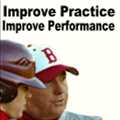
Build a house or build a swing.it all starts with a good foundation.
You will play as good as you practice!
Writing a single article on something so complex that it causes sleepless nights for the best trained and
paid talents in the world is daunting.at least to this coach.
Styles vs. Absolutes
First - I cannot and will not debate hitting styles, though I certainly have my opinion. The reality is that
half of the Hall of Fame has an unconventional swing. I will leave this area to you in hopes that you will stay on the straight
and narrow and will continue gaining the knowledge it takes to help ALL your players season after season.
Here's a hint
Anything resembling the teachings of Ted Williams or The Mike Schmidt Hitting Study will keep you on the right
road.
For every bad swing a hitter practices...it may take three swings to correct!
Here's where I've chosen to start.by making one assumption.
(Be brutally honest with yourself before incorporating the steps below!)
I will assume that your player(s) have a basic working knowledge of good swing mechanics. Players who practice
incorrectly not only waste time, but tend to go backwards to the point that it can affect their future success and love of
the game. The baseball road is littered with talented players who have been eliminated from the game prematurely when poor
youth baseball swing mechanics become overmatched by superior pitching and the improvement of their own teammates.
Let's Get to the Point.And to the Progression
The following are six (6) areas that can simplify this building block process.
many which can be incorporated into a basement, garage or your own backyard.
Mirror Station - Simply put.if a player visually sees what he's doing incorrectly, he will make the
adjustments necessary to improve.
I recommend swinging in front of a full-length mirror beginning at 50% power, then 75%, progressing to game
speed and maybe even a few swings beyond 100% power.
Be logical about the number of swings depending on the player's age and strength.taking breaks in between.
Focus on fewer great swings.less is more!
(yes. take extra precautions when working indoors)
Tee Station - Simply put, you never grow out of hitting off the tee. It is the one station where players
can focus on every aspect of the swing.without having to track a moving object. This is critical! Hall of Famer Tony Gwynn
said something like, "I do nothing but tee work until January." I wish I could remember the exact quote, but you get the point.
Toss Station - Also known as soft toss or flip drills, this is a basic drill generally done with two
players. Balls are hit into a net after being tossed underhand in a short arc and at a 45° angle on the open side of the hitter
from a distance of around 6 feet. These consistent tosses (aimed at the hitter's front thigh or hip for straight-away hitting
and adjusted for hitting to various areas of the field) incorporate the lessons learned from tee work, adding the skill it
takes to hit a moving ball.
This important station allows players to get tons of swings in a short period of time and in a small area.
Hitters get tired quickly when the tosser doesn't allow time between swings. Be patient!
Front Toss & Short Toss - This is another important building block in the progression. A coach
or player will sit on a bucket behind a screen and toss pitches from directly in front of the player; usually in a cage or on a baseball field.
This can be done from a distance of 15 to 20 feet and then from a 35 foot distance. Pitches should be thrown consistently
and to particular zones, allowing the player to duplicate each swing as precisely as possible.
Note #1
Make sure your screen is in place and not in need of repair! Players and coaches should all be cautioned and
taught to focus on staying completely behind the protective screen during every pitch.
Note #2
When utilizing short toss drills from shorter distances of 15 to 20 feet, balls should be tossed underhand
so that the pitch will come in to the hitter at an angle more resembling that of a live pitch. This eliminates the "loopy"
throws which encourage the poor mechanics of an uppercut swing.
Dead BP - (Batting Practice) - Dead batting practice is simply the batting practice you see on every
field and at every level. You will see great examples of this when you go to a college or pro game two hours before the first
pitch. It is thrown from 55 feet (not the official pitcher-to-hitter distance of 60' 6"), generally from a platform or portable
mound. Pitches are thrown straight at around 55 to 65 mph.into particular hitting zones. These consistent pitches are designed
for the hitter to repeat his swings over and over with consistency; hitting balls hard and to particular areas of the field.
A ball field and a batting cage with or without a pitching machine is all that is needed.
Live BP - (Batting Practice) - Take dead BP and add the battle of pitcher (coaches or pitchers doing
the throwing) versus hitter, preferably in game conditions. In a team practice, I find maximum benefit when all defenders
are also playing this as a real game.
The backyard version of live BP incorporates a pitching machine and pitching machine with an autofeeder for
single player practices or a batting cage with a live pitcher behind a protective L-Screen.

